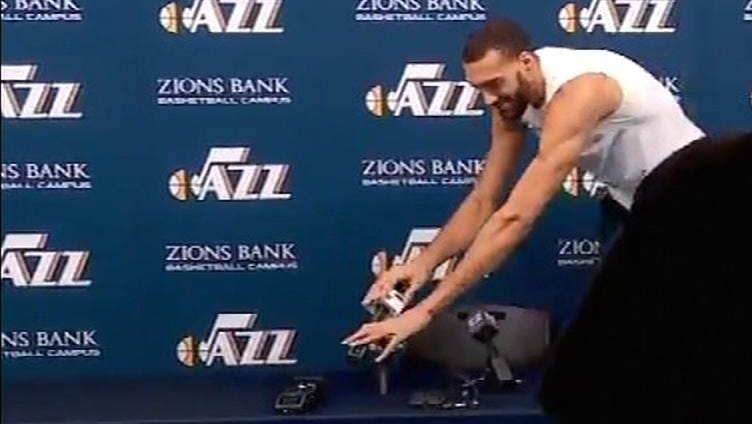Element of Surprise
If only Trump were still alive to read this...
A year ago this week, Rudy Gobert touched the mics. We all remember this—in retrospect, it will likely go down as the harbinger of our doom, the most publicly broadcast display of misguided confidence ever put to film. It was also, looking back now, funny as hell.
We were all that dumb. At least I was. 100%, no question, I would have done the same thing and thought it was a good bit. Good thing I’m not a French defensive stalwart for the current league-best Utah Jazz on a 5-year, $200 million contract.
And of course, we can all vividly recall the moment the NBA was shut down. When the aforementioned Monsieur Gobert and his team's subsequent game with the Oklahoma City Thunder was mysteriously cancelled as everyone on the court waited for it to begin? We felt that. It was a portentous, sobering moment for many reasons, but (and, bear with me here, I’m about to say something insanely stupid) wasn't it wild to see something so unexpected on TV?
Seriously—forget, for a moment, that we would all soon spiral into unprecedented chaos, and instead revel in the fact that a scene on our television sets truly did not go as planned. That a plot point that threw us for a loop wasn’t written and commissioned by a writers room. That real life and all its accompanying complexities had somehow reared its ugly head in the thing we were all, collectively, experiencing.
I guess this is me, embarrassingly, lamenting the loss of any sense of spontaneity in our cultural consumption these days. It feels increasingly difficult to find a genuine moment of surprise in the art that we decide to consume. Every song is recommended by Big Tech Algorithm; every book is handpicked and designed to look like something you want to touch with your hands at the bookstore; every warmed-over TV recommendation is offered up by a friend who, no, hasn’t seen it yet, but heard it’s good. When you sit down on the couch, you choose exactly what to watch; when you put on your headphones to go for a run, you’ve pre-selected the playlist. In lieu of discovery, instead of happening upon something that catches you off guard, your cultural intake is carefully scripted and programmed and fully pieced together to satisfy you. Intellectually, I know it feels good—I’m only consuming the best of the best, the things that I want to, and the range of my experiences will only be determined by the parameters I set—but I do feel, somewhere in my heart, that this kind of stinks.
To stick with basketball—because if there’s one thing that can withstand the forces of media consolidation, it’s definitely live sports!—I remember a night some years ago watching another daily installment of TNT’s flagship basketball program, Inside the NBA. Sports analysis, talking-head type programs like these are almost always (and more so on ESPN) carefully scripted out; each host/analyst knows their talking points, and they know how many seconds they’ve got to get them out before the next commercial break. So it goes.
Inside the NBA, however, is beloved for precisely the exact opposite reason. It's the one you’ve all seen parodied on SNL, with Shaq and Charles Barkley and White Guy Ernie, except they’re even more idiotic and hilarious and entertaining and off-the-cuff on the actual show. It often feels like these guys are just uncorking the first, questionable thoughts that come to their minds, with little regard for what is traditionally “good TV.”
And it leads to unbelievable moments like this, which I witnessed that night, years ago.
It’s Chuck calling an audible, seizing on the moment, and flat-out asking the much-maligned former superstar Dwight Howard (filling in for Shaq that night) why no one in the NBA likes him. It devolved into an extended therapy session on live TV. And it went on, fully broadcast, for 15 minutes.
In the grand scheme of things, this was inconsequential: athletes worth millions discussing the trials and tribulations of being an NBA player on a Ted Turner-owned network. But in the moment, I remember wondering if I had seen something so off-script, so gloriously unexpected, in ages.
What moments like these do we get anymore? I guess, like, those three or four days when the movie Cats was in theaters with the original special effects? It feels like God improvised when He made Rudy Gobert give Tom Hanks COVID. It was a deviation from the mean, an aberration we weren’t meant to witness. Something we could once rely on as a sturdy product of American cultural consumption (surprise) has now been sanded down and made sterile so as not to occupy us for more than two hours—no more wardrobe malfunctions at the Super Bowl, just Trump getting COVID and eventually being fine.
Yeah, this is a stupid, elitist thing to blather on about. More than half a million people have died in the US in one year. And it’s mortifying that this line of thinking has even taken up so much space in my brain (holy shit…“rent-free”…) when my guess is the average American is just watching The Masked Singer and living their damn lives. But even that—that daily routine of nighttime TV and daytime radio—is the apotheosis of an orchestrated life. The culture feels inevitable and sad, something we’ve all resigned ourselves to pretend to like.
A classic Bill Simmons-ism is to determine a movie’s merit by the chances he'll finish the whole thing if, while surfing channels, he happens to scroll past it on linear TV. “The Fugitive? I mean, come on—I'm scrolling through and I see this on TNT? I’ve gotta finish the whole thing. You know I’m watching Harrison Ford confront the guy at the pharmaceutical event.” For all of his many faults, this is, to me, his most endearing neurosis. The thought of Bill Simmons still using the “Channel Up/Down” buttons on his remote is hilarious. But I get it. And even if I know it’s all been programmed, that it’s all been carefully picked over and focus-grouped by committee (of course The Bourne Supremacy is going to be on TNT at some point during the day), it still feels nice to stumble upon something you weren’t expecting. Hey. Somebody should make a website like that. StumbleUpon, or something.
Ritam’s Footnote
As someone who famously Grew Up Without Cable (cue groans), I’ve never just been able to put on the TV and just… let it go. I find TV ads to be grating and eerie; I’m aware everyone feels this way, but no one else is as annoying about it as me. But I get the idea here–when I did first start watching TV, after I got a laptop in high school, I wasn’t picking shows based on reviews or buzz–I just chose things based on the premise, which is how I accidentally watched five full seasons of Suits.
“No, but I’ve heard it’s good,” is definitely a top 10 phrase from the past year, along with “We got tested first, don’t worry,” and “I don’t know, it felt safe to me.” It seems like entertainment during the pandemic has become optimized to a fault. People in our sociocultural sphere claim reality shows as guilty pleasures, seeing them as an act of rebellion against the Prestige TV hegemony, but those shows’ strange determination to focus on the petty in the face of global tragedy leaves a bitter taste in my mouth. Everything else is delivered to us by algorithm; our friends’ recommendations informed by the same marketing push Variety puff pieces or glowing NYT reviews. I told a bunch of people to watch It’s A Sin this week.
Watching Stuff during the pandemic feels like you’re jumping from Thing to Thing, desperately trying to keep the upright broom of anxiety and boredom from falling off your outstretched palm, because if you bend over to pick it up, you might catch a glimpse of your own ass. And that’s terrifying. But if you want to really know who you are these days, you might have to let that broom drop, bend over, and take a big sniff.




